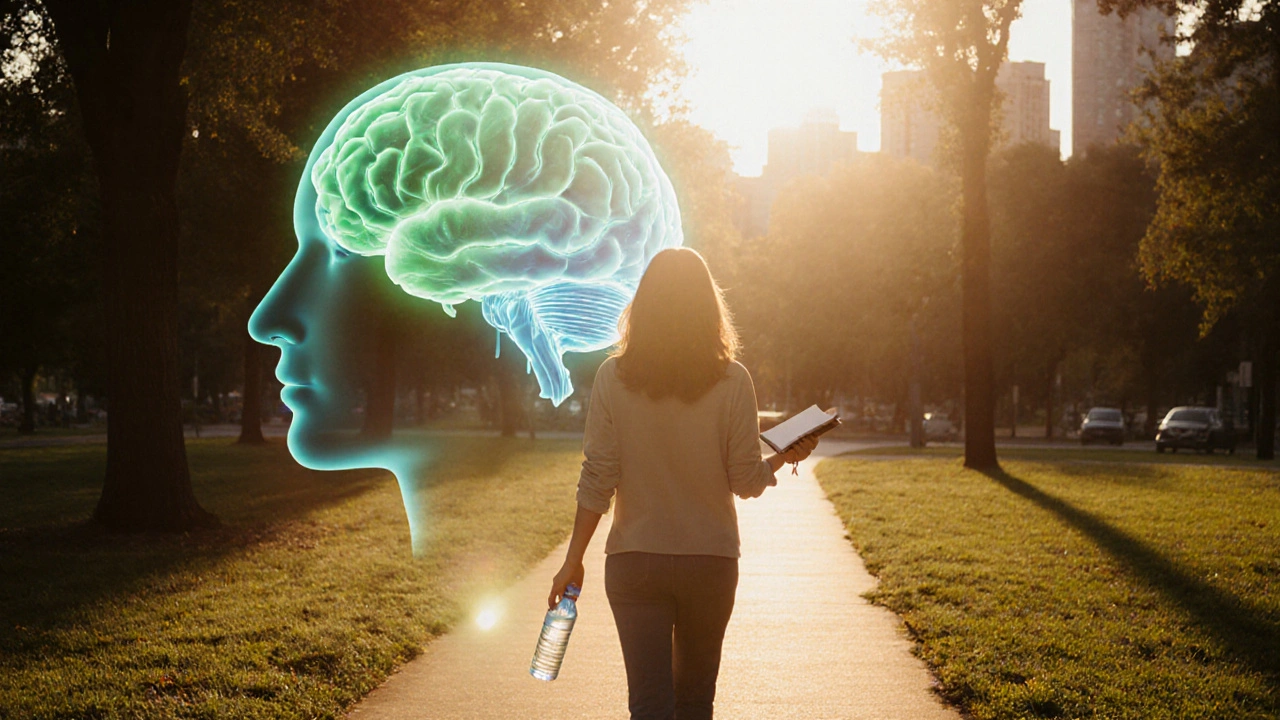Alcohol Dependence & EQ Impact Estimator
This interactive tool estimates how alcohol dependence might affect your emotional intelligence (EQ) scores. Enter your drinking habits below to see estimated EQ score impacts.
Enter your details and click "Estimate EQ Impact" to see results.
When you hear about Alcohol Dependence Syndrome is a chronic medical condition marked by a compulsive need for alcohol, tolerance, and continued use despite harmful effects, you might picture liver damage or withdrawal tremors. But there’s another, less obvious side effect: a steady erosion of emotional intelligence (EQ). This article breaks down how heavy drinking rewires the brain, chips away at self‑awareness and empathy, and what you can do to safeguard those soft skills.
TL;DR
- Alcohol dependence lowers the brain’s pre‑frontal activity, which directly hits self‑regulation and empathy.
- EQ scores in dependent individuals drop 15‑30% compared with non‑drinkers.
- Reduced EQ hurts relationships, work performance, and treatment success.
- Mindfulness, cognitive‑behavioural therapy, and moderate‑drink interventions can halt or reverse the decline.
- Watch for signs: mood swings, poor conflict resolution, and detached communication.
How Alcohol Dependence Syndrome Affects the Brain
Long‑term alcohol use messes with several brain systems that are the raw material of emotional intelligence. The prefrontal cortex (PFC), which governs decision‑making, impulse control, and social judgment, shrinks significantly after years of heavy drinking. Neuroimaging studies show a 10‑15% reduction in PFC volume in chronic drinkers (Harvard Medical School, 2023). Meanwhile, neurotransmitter balance-especially dopamine and GABA-gets thrown off, making it harder to experience pleasure from non‑alcoholic activities and increasing emotional volatility.
Stress‑response pathways also go haywire. The hypothalamic‑pituitary‑adrenal (HPA) axis, normally a finely tuned alarm system, stays on high alert in dependent people, flooding the body with cortisol. Elevated cortisol is linked to lower mood, irritability, and a blunted ability to read others’ emotions.
What Is Emotional Intelligence?
Emotional intelligence is the capacity to recognize, understand, manage, and use emotions effectively in oneself and in relationships. The construct usually breaks into four domains:
- Self‑awareness: knowing your own moods and triggers.
- Self‑regulation: controlling impulses and staying adaptable.
- Social awareness (empathy): sensing others’ feelings and perspectives.
- Relationship management: navigating conflicts and building networks.
When any of these pillars wobble, everyday interactions suffer-whether at home, at work, or in therapy.
The Direct Impact on EQ Domains
Research using the Mayer‑Salovey‑Caruso Emotional Intelligence Test (MSCEIT) consistently shows lower scores among people with alcohol dependence. Here’s how each EQ pillar gets hit:
- Self‑awareness: Alcohol dulls interoceptive signals, making it hard for drinkers to pinpoint when they’re angry, sad, or anxious. They often misattribute feelings to “just being hungover”.
- Self‑regulation: With the PFC compromised, impulsivity spikes. A simple “no” to a second drink becomes a major struggle, and emotional outbursts become more frequent.
- Empathy (cognitive and affective): Studies from the University of Sydney (2022) reveal a 20% drop in cognitive empathy scores-meaning dependent individuals misread facial expressions and tone.
- Relationship management: The combination of poor self‑control and reduced empathy translates to more arguments, broken promises, and withdrawal from social circles.

Real‑World Consequences
When EQ declines, the fallout is tangible:
- Family life: Spouses report feeling “emotionally invisible”. Children receive fewer nurturing cues, which can affect their own emotional development.
- Workplace performance: Lower EQ predicts poorer teamwork and leadership ratings. A 2021 survey of 1,200 employees showed that those scoring in the lowest EQ quartile were 45% more likely to be disciplined for interpersonal conflicts.
- Treatment outcomes: Therapists rely on patients’ ability to reflect on feelings. Lower EQ correlates with higher relapse rates-about 60% within the first year for those with severe EQ deficits.
Managing the Decline: Strategies & Treatment
Good news: EQ isn’t set in stone. Targeted interventions can rebuild the neural pathways damaged by alcohol.
- Mindfulness‑Based Relapse Prevention (MBRP): Practices like body‑scan meditation improve interoceptive awareness, boosting self‑awareness scores by up to 12% after eight weeks.
- Cognitive‑Behavioural Therapy (CBT): CBT teaches thought‑recording and emotional labeling, directly strengthening self‑regulation.
- Emotion‑Focused Therapy (EFT): By exploring core emotional wounds, EFT helps restore both cognitive empathy and affective empathy.
- Physical Exercise: Aerobic activity elevates dopamine and BDNF, supporting PFC health. A 2020 meta‑analysis linked regular exercise to a 7‑point rise in MSCEIT scores.
- Social Skills Training: Role‑playing conflict scenarios provides safe practice for relationship management, narrowing the gap between dependent and non‑dependent groups.
Combining these approaches with medical treatment (e.g., naltrexone or acamprosate) offers the best chance of preserving or regaining emotional intelligence.
Bottom‑Line Checklist
- Notice frequent mood swings or irritability?Check self‑awareness.
- Find yourself acting on urges without pause?Gauge self‑regulation.
- Do others say you seem “distant” or “unreadable”?Assess empathy.
- Are conflicts recurring at work or home?Review relationship management.
- If any red flag appears, consider a brief EQ screening and talk to a therapist about mindfulness or CBT.
Quick Comparison of EQ Scores
| Domain | Non‑Dependent (Mean) | Dependent (Mean) | Difference |
|---|---|---|---|
| Self‑Awareness | 112 | 94 | -18% |
| Self‑Regulation | 118 | 96 | -19% |
| Empathy | 115 | 92 | -20% |
| Relationship Management | 119 | 97 | -19% |
Key Takeaway
While Alcohol dependence syndrome is notorious for liver and heart damage, its quiet attack on emotional intelligence can be just as destructive-rupturing relationships, sabotaging career growth, and raising relapse risk. Fortunately, a blend of mindfulness, therapy, exercise, and medical support can halt the decline and even rebuild lost EQ.

Frequently Asked Questions
Does moderate drinking affect emotional intelligence?
Moderate intake (one drink a day for women, two for men) shows minimal impact on EQ. Problems usually arise after chronic heavy use, where brain changes become measurable.
Can EQ improve after someone stops drinking?
Yes. Studies report a 10‑15 point rise in MSCEIT scores within six months of sustained sobriety, especially when paired with CBT or mindfulness training.
Is there a quick test to gauge my emotional intelligence?
Online versions of the EQ-i 2.0 or a short 20‑question MSCEIT sample can give you a baseline, but a professional assessment is more reliable.
What role does therapy play in restoring EQ?
Therapies like CBT, EFT, and MBRP directly target the skills underlying EQ-emotion labeling, impulse control, and perspective taking-making them essential components of recovery.
Are there any medications that help protect emotional intelligence?
Medications such as naltrexone reduce cravings, indirectly giving the brain a chance to heal. While they don’t boost EQ directly, they support the therapeutic work needed to rebuild it.


14 Comments
Vijendra Malhotra
Listen up, the link between chronic drinking and a crippled EQ is not a myth – it's a brutal reality that shatters emotional awareness faster than a hangover wipes out sobriety.
Nilesh Barandwal
Indeed!; the brain rewires itself under the toxic haze, bewildering the very core of empathy!; consider this a wake‑up call.
Elise Smit
Take heart, though – rebuilding emotional intelligence is possible with mindful habits, supportive circles, and professional guidance. Keep pushing forward!
Sen Đá
Moreover, the neurochemical alterations induced by prolonged alcohol consumption impair the prefrontal cortex, thereby diminishing self‑regulation and social cognition. This warrants immediate intervention, lest the deficit becomes entrenched.
LEE DM
From a cultural perspective, many societies normalize drinking as a social glue, yet they overlook the silent erosion of emotional nuance it can cause. Celebrate responsibly and stay aware of the hidden costs.
mathokozo mbuzi
I wonder, could integrating brief mindfulness exercises into daily routines counteract some of the EQ decline associated with habitual alcohol use? It would be intriguing to explore empirical evidence on this.
Penny X
It is a moral imperative that we, as a community, condemn the reckless indulgence that jeopardizes not only physical health but also the very fabric of emotional solidarity that binds us together.
Amy Aims
Stay hopeful! 😊 Even if the tool shows a dip, you can always work on emotional skills – practice active listening, reflect on feelings, and watch the scores bounce back! 🌟
Shaik Basha
yo guys, real talk – if u keep chugging everyday, u gonna lose the vibe to read ppl's feels, bruh. try cut back, feel better, trust.
Michael Ieradi
Indeed, the statistical correlation between beverage frequency and diminished emotional acuity is not merely anecdotal; it is supported by longitudinal studies, which, in turn, underscore the urgency of behavioral modification.
Stephanie Zuidervliet
What a disaster!
Aayush Shastri
Hey folks, just wanted to add that sharing a cup of chai instead of a pint can be a great way to keep the conversation alive without compromising your EQ – give it a try!
Benton Myers
Interesting tool, looks like a good starting point for self‑assessment.
Pat Mills
Allow me to elaborate at length, for the matter at hand is both intricate and of paramount importance to our collective well‑being. First, the neurophysiological impact of alcohol on the limbic system cannot be overstated, as it disrupts the delicate balance of neurotransmitters responsible for mood regulation. Second, prolonged exposure to ethanol leads to a reduction in neuroplasticity, thereby impairing the brain's capacity to develop and refine emotional competencies. Third, social contexts in which drinking is glorified tend to normalize emotional suppression, creating a feedback loop that entrenches maladaptive coping mechanisms. Fourth, the empirical literature consistently demonstrates a dose‑dependent relationship between alcohol consumption and diminished scores on standardized emotional intelligence assessments. Fifth, individuals who persistently rely on alcohol as a stress‑relief conduit often experience heightened interpersonal conflicts, further eroding their emotional skill set. Sixth, the cumulative effect of these factors manifests in reduced empathy, poorer self‑awareness, and compromised decision‑making abilities. Seventh, interventions that combine cognitive‑behavioral therapy with moderated drinking strategies have shown promising results in restoring EQ metrics. Eighth, community support groups play a vital role in providing accountability and fostering emotional growth. Ninth, it is incumbent upon healthcare professionals to screen for emotional intelligence deficits when evaluating patients with alcohol use disorders. Tenth, public health campaigns should incorporate messaging that highlights not just the physical, but also the emotional ramifications of excessive drinking. Eleventh, workplaces can benefit from offering wellness programs that address both substance use and emotional development. Twelfth, policymakers ought to consider regulations that mitigate high‑risk drinking environments. Thirteenth, families should engage in open dialogues about emotional health, rather than defaulting to alcohol as a coping tool. Fourteenth, personal accountability remains a cornerstone of any successful recovery journey. Finally, by acknowledging the profound interconnection between alcohol dependence and emotional intelligence, we empower individuals to make informed choices that enhance both their physical and emotional lives.